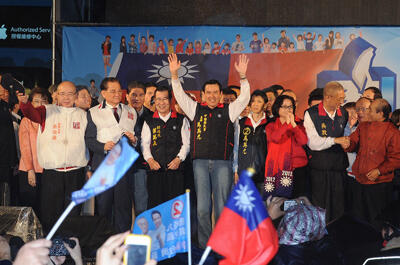Incumbent Ma Ying-jeou of the Kuomintang (Nationalist Party) was reelected president of Taiwan, defeating Tsai Ing-wen of the Democratic Progressive Party. Our panel included long-time students of Taiwan politics and four specialists who traveled to Taiwan to observe the election. They examined the conduct of the election and voting patterns and discussed what the election may mean for Taiwan, for China, and for the United States.
 Clayton Dube, University of Southern California
Clayton Dube, University of Southern California
Clayton Dube (杜克雷) heads the U.S.-China Institute (南加州大学美中学院). He came to USC in 2006 from UCLA where he was assistant director of the Asia Institute.
Click here to view Clayton Dube's presentation.
 Miriam Ming-cheng Lo, University of California, Davis
Miriam Ming-cheng Lo, University of California, Davis
Miriam Ming-cheng Lo teaches sociology. Her research mainly focuses on the cultural processes of political and medical institutions. Additionally, Lo specializes in civil societies, political cultures, health and illness experiences, cultural sociology, and comparative historical sociology.
Click here to view Ming-cheng Lo's presentation
 Stanley Rosen, University of Southern California
Stanley Rosen, University of Southern California
Stanley Rosen teaches political science and is the former director of the East Asian Studies Center. His research focuses on the interaction between state and society in China. He's also written extensively on film and on education.
Click here to view Stanley Rosen's presentation.
 Vincent Wang, University of Richmond
Vincent Wang, University of Richmond
Vincent Wang teaches political science and is associate dean at the University of Richmond. He is the author of numerous articles on Taiwan and on regional security and economic affairs. Wang commented from Richmond.
Prof. Wang spoke to the group from Virginia.
 Daniel Lynch, University of Southern California
Daniel Lynch, University of Southern California
Daniel Lynch teaches international relations at the University of Southern California. Lynch is the author Rising China and Asian Democratization: Socialization to “Global Culture” in the Political Transformations of Thailand, China, and Taiwan and After the Propaganda State: Media, Politics, and “Thought Work” in Reformed China.
Click here to view Daniel Lynch's presentation.**************************************************
Other USCI resources on Taiwan:
- Shelley Rigger, “Why Taiwan Matters”
- The Thaw: Taiwan and China’s Changing Relationship (Part 1 and Part 2)
- 2008 Taiwan Election Symposium
- Election ’08 and the Challenge of China: Part 4, Taiwan and China’s Military Buildup
- Documents: US-Taiwan and Contemporary Taiwan
- Talking Points - symposium summary (Jan. 23)
- Talking Points - Taiwan/China trade




